Happy Wednesday! The Dispatch staff fantasy football league is well underway after the first week of regular season NFL play: Everyone, pour one out for our friend Ryan Brown, who, after the first game, dropped from first in the power rankings to 14th. Early days yet, Ryan!
Quick Hits: Today’s Top Stories
- The Israel Defense Forces (IDF) said it is “highly likely” that 26-year-old Turkish-American citizen Aysenur Eygi “was hit indirectly and unintentionally by IDF fire” on Saturday, according to an IDF investigation. Investigators said that IDF soldiers had targeted a “key instigator” of violent riots in the West Bank village of Beita—where dozens of Palestinian protesters allegedly threw rocks at Israeli security forces and burned tires—but instead unintentionally struck and killed Eygi. In the wake of the investigation, U.S. Secretary of State Antony Blinken on Tuesday urged the Israeli military to change its rules of engagement in the West Bank.
- Meanwhile, the IDF said on Tuesday that it had killed several senior Hamas leaders—including at least three who were directly involved in the terror group’s October 7 terrorist attacks—in an airstrike that hit a Hamas command and control center operating within a humanitarian zone housing displaced Palestinians near Khan Younis. The Hamas-run Civil Defense authority claimed the attack killed at least 40 people, a figure the IDF said is inaccurate. Gaza’s health ministry—also operated by the terrorist organization—reported a lower death toll of 19 people, with at least 60 others injured. “Despite the extensive measures taken by the IDF to enable the Gazan population to move away from combat zones, including by designating a Humanitarian Area, the Hamas terrorist organization continues to embed its operatives and military infrastructure in the Humanitarian Area and systematically use Gazan civilians as a human shield for its terrorist activities,” the IDF said following the strike.
- The Biden administration Tuesday placed new sanctions on Iran and three Iranian-linked companies after Western officials confirmed that Iran sent a shipment of short-range ballistic missiles to Russia to aid Moscow’s war in Ukraine. The three companies sanctioned were involved in the transportation of the weapons from Iran and into Russian hands, including Iran Air—the country’s state-owned, national airline. “The expanding military partnership between Iran and Russia threatens European security and illustrates how Iran’s destabilizing influence reaches beyond the Middle East to undermine security around the world,” the State Department said in a statement. The U.S.-supplied Patriot air defense system will be the only Ukrainian air defense reliably capable of shooting down the missiles, though the systems are in short supply and Ukraine has shot down only 10 percent of Russian ballistic missiles fired in the last six months.
- Ukraine on Tuesday launched more than 140 military drones at various sites across Russia, including Moscow, in one of its largest direct attacks against the Russian capital thus far. Russian authorities claimed a 46-year-old civilian woman was killed in the Russian town of Ramenskoye—located on the outskirts of Moscow—after drone strikes hit a residential apartment building, while more than a dozen people were injured across the country. The Ukrainian attack also caused Russia to temporarily shut down three airports near Moscow, though two resumed operations later on Tuesday.
- Attorneys general from 42 U.S. states signed a letter on Tuesday urging Congress to pass legislation requiring social media platforms to display a surgeon general’s warning label. U.S. Surgeon General Vivek Murthy promoted a similar proposal in June, citing the mental health risk social media poses to children. “We sometimes disagree about important issues, but all of us share an abiding concern for the safety of the kids in our jurisdictions—and algorithm-driven social media platforms threaten that safety,” the attorneys general wrote. “A growing body of research links young people’s use of those social media platforms to a variety of serious psychological harms, including depression, anxiety, and suicidal ideation.”
- Michigan’s state Supreme Court on Monday reversed a lower court’s decision, ruling that former independent presidential candidate Robert F. Kennedy—who suspended his campaign and endorsed former President Donald Trump—will remain on ballots in Michigan in the 2024 election. Because the ballots have already been printed, the court ruled, Kennedy did not have “an entitlement to this extraordinary relief.” Conversely, the North Carolina state Supreme Court ruled on Monday that state ballots will be reprinted without Kennedy’s name, stating that otherwise the ballots could confuse voters into believing Kennedy is still seeking the presidency in 2024.
- Republican House Speaker Mike Johnson on Monday held a ceremony honoring the 13 U.S. service members killed three years ago in the ISIS-K terrorist bombing outside the Kabul, Afghanistan, airport in August 2021. Joined by House Minority Leader Hakeem Jeffries, Senate Majority Leader Chuck Schumer, Senate Minority Leader Mitch McConnell, and the families of the fallen, Johnson posthumously awarded the service members the Congressional Gold Medal—Congress’ highest and oldest award. “Our nation owes a profound debt of gratitude to these service members and those here today who were with them in Kabul,” Johnson said. “We also owe them something deeper, and that is an apology to the families who are here. … We are sorry.”
- Two commercial airplanes collided with each other on Tuesday morning on the tarmac at Georgia’s Hartsfield-Jackson Atlanta International Airport, though the accident caused no injuries. According to Delta Air Lines, a Delta commercial plane destined for Tokyo and carrying 221 passengers hit the tail-end of an Endeavor Air commercial plane—owned by Delta—that was carrying 56 passengers bound for Lafayette, Louisiana. It wasn’t immediately clear what caused the accident, but the National Transportation Safety Board is investigating.
‘A Bunch of Lies, Grievances, and Name-Calling’
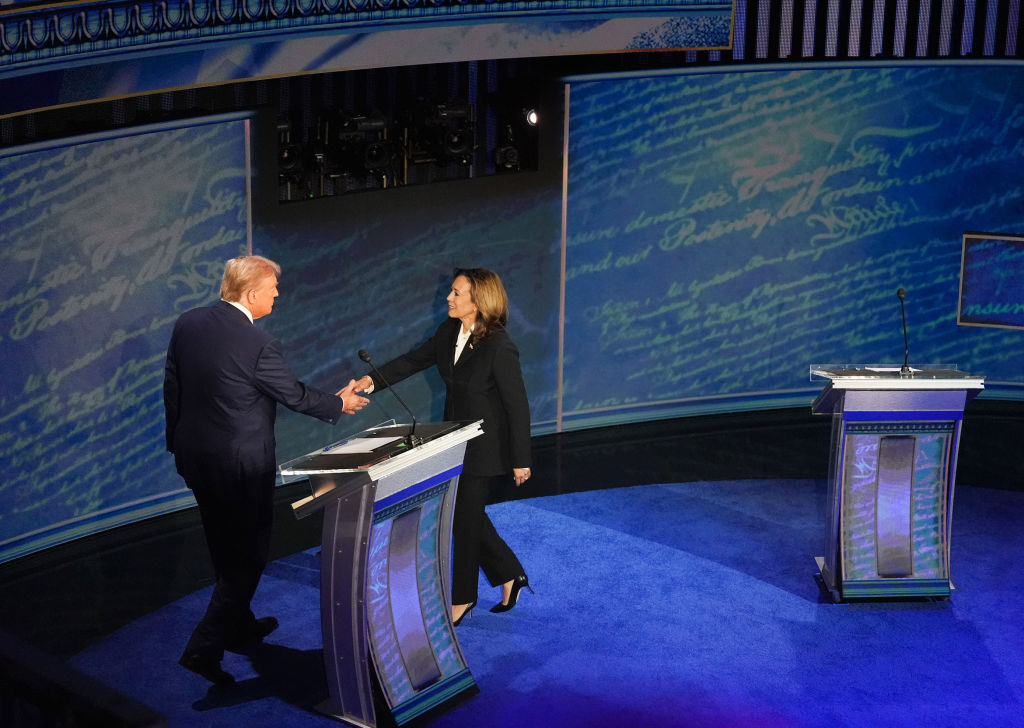
Vice President Kamala Harris opened the presidential debate on Tuesday by chasing former President Donald Trump across the stage.
As Trump moved immediately to take his place behind his podium in the National Constitution Center in Philadelphia, Harris crossed first to the middle and then to the far side of the stage—bobbing slightly to try to anticipate where he was headed—to shake his hand. They had, after all, never met. “Nice to see you, have fun,” Trump told her.
And she seemed to. The vice president began the night as she planned to continue it: by putting Trump on the back foot. In a historically tight race, Harris—who hasn’t spent much time since becoming the nominee in unscripted public settings and has a yearslong trail of inconsistent policy positions in her wake—could have torpedoed her chances of winning the presidency with a bad night on Tuesday. But she avoided answering tough questions about her vulnerabilities in part by successfully baiting the former president into very online, lie-laden rants.
After a jubilant start to the campaign, and a bump for the new Democratic ticket, the race remains quite close. Sunday’s New York Times/Siena College poll of likely voters found Trump leading Harris 48 percent to 47 percent, almost the exact same breakdown as the poll conducted a little over a month earlier. As we noted on Monday, the race is arguably the closest in American history. Almost no major polls have shown either candidate with a lead larger than the margin of error, and until that begins to happen consistently, the race is effectively a dead heat.
For most of its short life, the Harris campaign has focused on projecting joy and normalcy, as well as avoiding policy substance like the plague. Still, as Sarah pointed out on Tuesday, “For the sliver of people up for grabs, vibes can matter a lot”—and vibes may be all they hear about last night’s debate.
On Sunday night, just in time for the debate, Harris released a list of policy proposals, highlighting her support for middle- and working-class tax cuts, protecting abortion rights, and fixing the immigration system. Harris reiterated much of the broad contours of those proposals in her opening answer on Tuesday, summarizing her plans to build what she calls an “opportunity economy.” She promised that she’d sign a bill to restore the Roe v. Wade status quo at the federal level, criticized Trump for sinking the bipartisan immigration reform bill from earlier this year, and backed President Joe Biden’s foreign policy agenda on Israel and Gaza.
In the opening half-hour of the debate, the former president seemed relaxed and in typical form: light on policy—like his opponent—but heavy on the fact-free jabs. “I had no inflation, virtually no inflation, they had the highest inflation, perhaps in the history of our country because I’ve never seen a worse period of time,” Trump said of price increases during Biden’s term. At one point he even hung his own running mate, Sen. J.D. Vance of Ohio, out to dry, claiming he’d never discussed vetoing a federal abortion ban with Vance despite the senator saying Trump would do so if presented with such a bill.
Harris came out swinging, too, poking Trump on Project 2025—the policy document drawn up by a conservative think tank that has become an albatross around the former president’s neck—and panning “the same old, tired playbook” from Trump: “a bunch of lies, grievances, and name-calling.”
Then, Harris landed what would ultimately prove to be the knockout punch of the night. Responding to a question on immigration—a weak issue for her—Harris pivoted to the former president. “He’s going to talk about immigration a lot tonight even when it’s not the subject that is being raised,” she said, sounding a bit like a well-rehearsed prosecutor addressing a jury. “And I’m going to do something really unusual and I’m going to invite you to attend one of Donald Trump’s rallies, because it’s a really interesting thing to watch.”
“People start leaving his rallies early out of exhaustion and boredom,” Harris said as the usually impassive Trump raised his eyebrows. “And I will tell you, the one thing you will not hear him talk about is you.”
From that moment on, Trump’s composure—much ballyhooed during the fateful debate with Biden when Trump seemed content to let the focus be on the president’s onstage meltdown—permanently slipped. “We have the biggest rallies, the most incredible rallies in the history of politics,” he responded.
But he wasn’t done, turning back to immigration. “In Springfield, they’re eating the dogs!” he bellowed. “The people that came in. They’re eating the cats. They’re eating—they’re eating the pets of the people that live there. And this is what’s happening in our country.”
For the blissfully uninitiated, this was a reference to a viral social media claim that Haitian immigrants in Springfield, Ohio, were stealing and eating pets and local waterfowl. “Immigrants eating pets, I was a bit confused about that,” said Katherine Bronov, an American University student told TMD from the Harris campaign debate watch party in Philadelphia. Bronov said that even though she’s “chronically online,” she hadn’t come across the story. The Dispatch fact-checked these claims on Tuesday, debunking the fabricated story that had nevertheless settled in pride of place on the social media feeds of many elected Republicans.
Perhaps Trump thought highlighting threats to cats would help win back “childless cat lady” votes, but in fact, it only underscored how enmeshed the former president is in the world of the fringe online right: Laura Loomer—a conspiracy theorist, far-right activist, and social media personality—flew with Trump to the debate yesterday. Just before the event, he FaceTimed with online right-wing influencers.
After the rally jab, the former president leaned into his most unhinged impulses. When pressed by moderator David Muir on his role in the Capitol riot on January 6, he evoked Ashli Babbitt, a rioter who was shot by police as she tried to force her way into the Speaker’s Lobby just feet from lawmakers, and suggested that no one on the “other side” was killed that day. He referred to himself and the rioters as “we” before stopping himself and saying “this group of people,” instead.
He also reversed his apparent admission last week that he’d lost the 2020 election “by a whisker,” saying that, in fact, he didn’t “acknowledge at all” that he lost the election and the comment was sarcasm.
In a tense moment, he also suggested Harris was the reason he was shot in July. “She weaponized. I probably took a bullet to the head because of the things that they say about me,” he said. “They talk about democracy. I’m a threat to democracy. They’re the threat to democracy.”
The former president’s answers highlighted why at least some disaffected Republicans have thrown their support behind Harris. “I think there are probably lots of people who have policy misgivings with Vice President Harris, but like me, will vote for her because of character and fitness concerns,” Tuan Samahon—a Villanova University law professor and a Republican before 2016—told TMD at the Harris watch party.
Samahon said before the debate started that he hoped the vice president would reassure independents and disenchanted Republicans like himself that she’d represent their interests. “She did try to symbolically reassure that she would be president for all, that she would turn the page and look forward,” he said afterward. “But I thought more persuasive was what she elicited from Trump—Trump’s repeated incapacity to assure that he could or would be president of all. His outbursts reaffirmed he is a small, petty, and self-regarding man who is in it for one person: Trump.”
The former president’s inability to keep his cool made Harris’ night much easier than it might have otherwise been. On two of her biggest electoral weaknesses—the border and various flips flops on left-wing positions—Harris was largely able to evade serious questioning as Trump demanded more time to redress grievances.
Harris also had to play surprisingly little defense regarding her own record. When moderators Muir and Linsey Davis asked her about all the previous positions she is now backing away from—defunding the police, decriminalizing illegal immigration, cracking down on gun ownership, and banning fracking—Harris vaguely answered that while some positions had changed, she had always prioritized “standing up for those who are most vulnerable” and asserted that the “true measure of a leader is not about beating people down but building them up.” She received no follow-up questions.
The vice president was back on offense when it came to foreign policy, where she focused on making Trump seem easily swayed by—and, indeed, beholden to—foreign strongmen. And his rebuttals seemed only to reinforce her line of attack. At one point, Harris claimed that “world leaders are laughing at Donald Trump,” to which he retorted that at least Hungarian Prime Minister Viktor Orbán, who has a … pliable … relationship with the democratic process, liked him. He also cited his supposed intimidation factor as a deterrent, claiming that if he were president, the wars in Ukraine and the Middle East “never would have started.”
Trump illustrated that he is far more interested in ending wars than in winning them: He insisted the wars in Ukraine and Gaza could be easily “settled,” but didn’t say how and multiple times refused to say he wanted Ukraine to win the war against Russia. “I want the war to stop,” he said. The former president also claimed that Harris “hates Israel” and ominously predicted that “Israel will not exist within two years from now” if she becomes president.
After the debate, Harris and second gentleman Doug Emhoff joined her supporters at the watch party. Emhoff embraced his proud husband role, shouting, “I told you she was ready,” as he introduced Harris. The vice president offered a cautiously optimistic assessment of the debate, saying, “I think that we think today was a good day.” But she quickly added that the race is far from over: “We’re still the underdogs in this race, it’s tight.”
In a slightly less circumspect fashion—and perhaps tacitly admitting he felt like he had some clean-up work to do after his performance—Trump opted to stick around at the debate venue and spin for himself. “I think it was the best debate personally that I have had,” he told scores of reporters as they struggled to hear him in the cavernous spin room. “I felt very good. I had a good time doing it.”
Worth Your Time
- Today marks the 23rd anniversary of the 9/11 terrorist attacks. In a gripping piece of history for Politico Magazine, journalist Garrett M. Graff in 2016 interviewed two dozen crew, staff, military personnel, and passengers who were on and around Air Force One immediately after the attacks that morning. “[Chief of staff Andy Card] and I are there with the president,” said adviser Karl Rove. “The president gets this call from [Vice President Dick] Cheney—we didn’t know who it was at the time, we just knew the phone rang. He said ‘yes,’ then there was a pause as he listened. Then another ‘yes.’ You had an unreal sense of time that whole day. I don’t know whether it was 10 seconds or two minutes. Then he said, ‘You have my authorization.’ Then he listens for a while longer. He closes off the conversation. He turns to us and says that he’s just authorized the shoot-down of hijacked airliners.”
- What does Republican Sen. Mike Lee of Utah think now of his last-minute push at the 2016 RNC convention to stop the first Trump presidential nomination? “When I showed him a photograph—the senator himself, on the convention floor back in 2016, screaming in opposition to a rules package that effectively ended the campaign to free delegates to vote against Trump—Lee grimaced,” Tim Alberta wrote in The Atlantic. “I asked him whether he’d changed over the past eight years. ‘All of us change as times change,’ he said, shrugging. As our conversation went on, however, the senator’s tone shifted. He began to insist that, in fact, he hadn’t changed; that what the world was seeing and hearing from him was no Trump-induced abnormality but rather the realest, rawest version of himself. ‘Those who know me,’ Lee said, ‘know that privately, this is who I am.’ … [The] more we dwelled on Lee’s actions during the 2016 campaign—suggesting that Trump was an aspiring autocrat, attempting to sabotage his nomination, calling for him to quit the race—the more contrite Lee sounded for having doubted Trump in the first place. ‘I was a jerk,’ the senator said. ‘I was a jerk to him.’”
Presented Without Comment
The Daily Pennsylvanian: [University Of Pennsylvania] To Limit Statements On Local And World Events In Move Toward Institutional Neutrality
Also Presented Without Comment
President Joe Biden, speaking to the press on Tuesday:
I’m going up to my granddaughter’s birthday in New York, then we’re going to watch the debate and tomorrow I’m doing 9/11.
Also Also Presented Without Comment
Rolling Stone: Taylor Swift Endorses Kamala Harris, Signs Post ‘Childless Cat Lady’
In the Zeitgeist
Yellowstone producer Taylor Sheridan is back at it again with another modern frontier tale featuring Jon Hamm, Demi Moore, and Billy Bob Thornton—delivering a line only he could make sound convincing: “I quit drinkin’—I’ll stick with beer.”
Toeing the Company Line
- Who won the debate? How did Harris put Trump on the defensive? Will it even matter? Steve was joined by Sarah, Jonah, Jamie, Kevin, Declan, and Alex to answer all those questions and more on a special post-debate Dispatch Live (🔒). Members who missed the conversation can catch a rerun—either video or audio-only—by clicking here.
- In the newsletters: The Dispatch Politics crew—and friends!—gave their previews of yesterday’s debate, and Nick explored whether Harris “rode the vibes” too long, past the point of diminishing returns.
- On the podcasts: Jonah interviews AEI’s Christine Rosen about her new book, The Extinction of Experience: Being Human in a Disembodied World on The Remnant.
- On the site: Jonah offers former Rep. Liz Cheney some advice and Dan Vallone explores how the U.S. let fear affect how we handled three recent generational crises.
Let Us Know
Did you watch the debate? If so, what did you make of Harris and Trump’s performances?




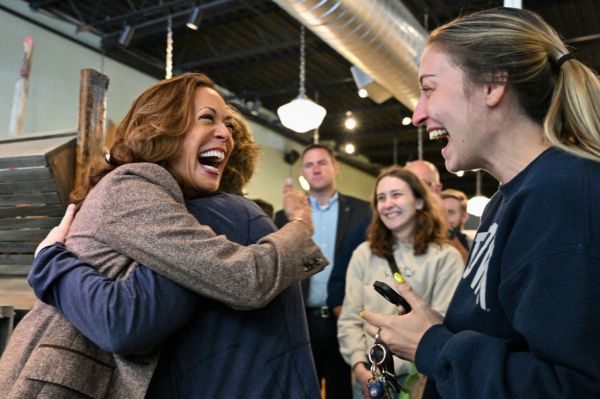
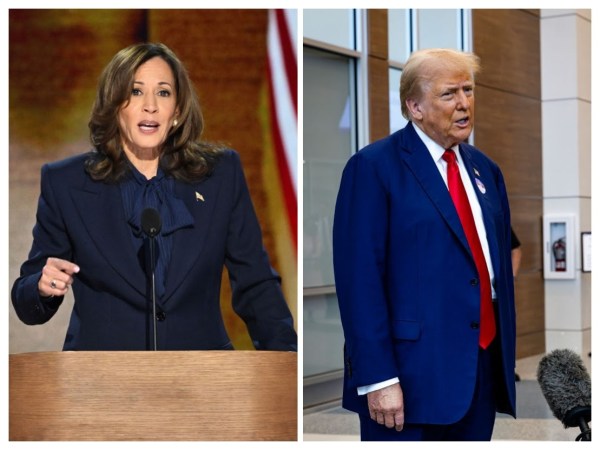
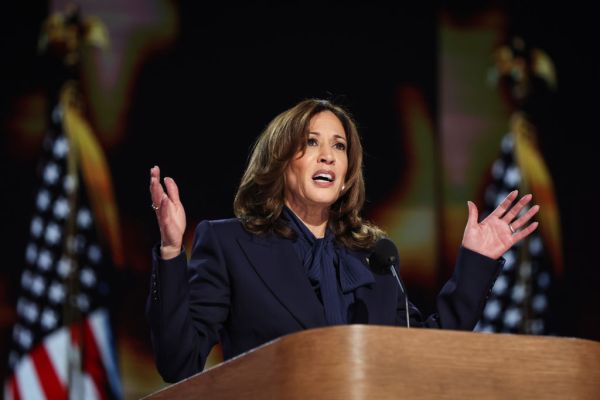
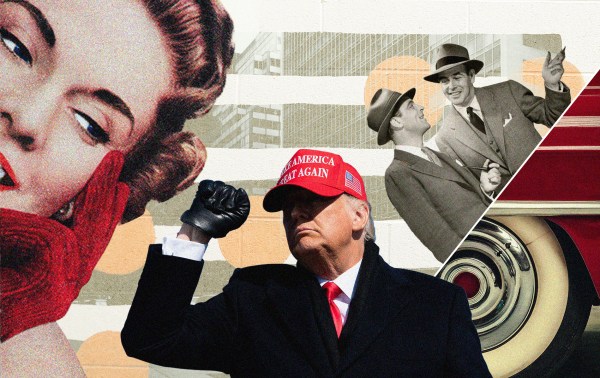
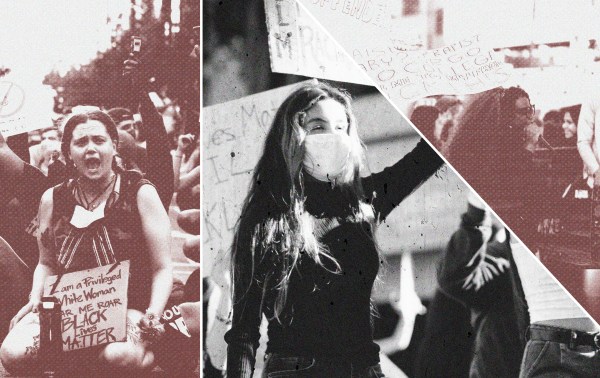
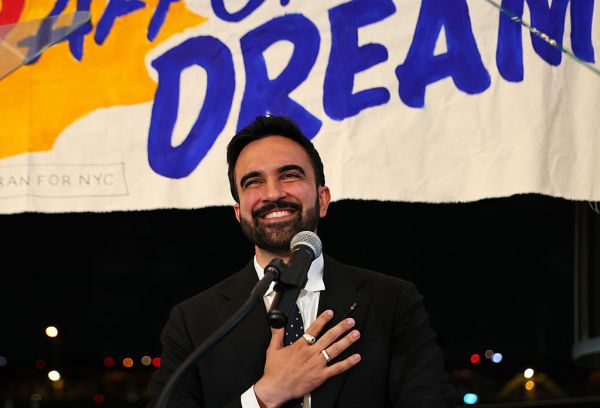
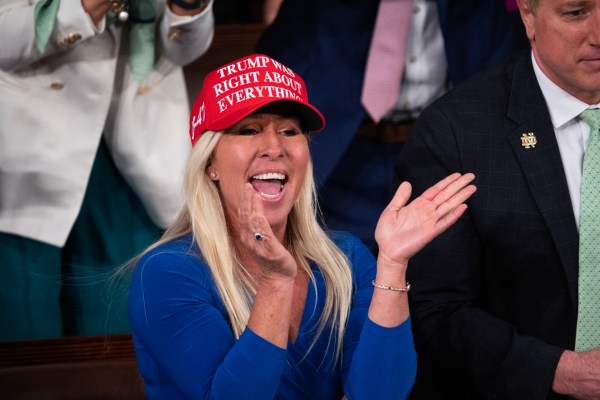

Please note that we at The Dispatch hold ourselves, our work, and our commenters to a higher standard than other places on the internet. We welcome comments that foster genuine debate or discussion—including comments critical of us or our work—but responses that include ad hominem attacks on fellow Dispatch members or are intended to stoke fear and anger may be moderated.
With your membership, you only have the ability to comment on The Morning Dispatch articles. Consider upgrading to join the conversation everywhere.